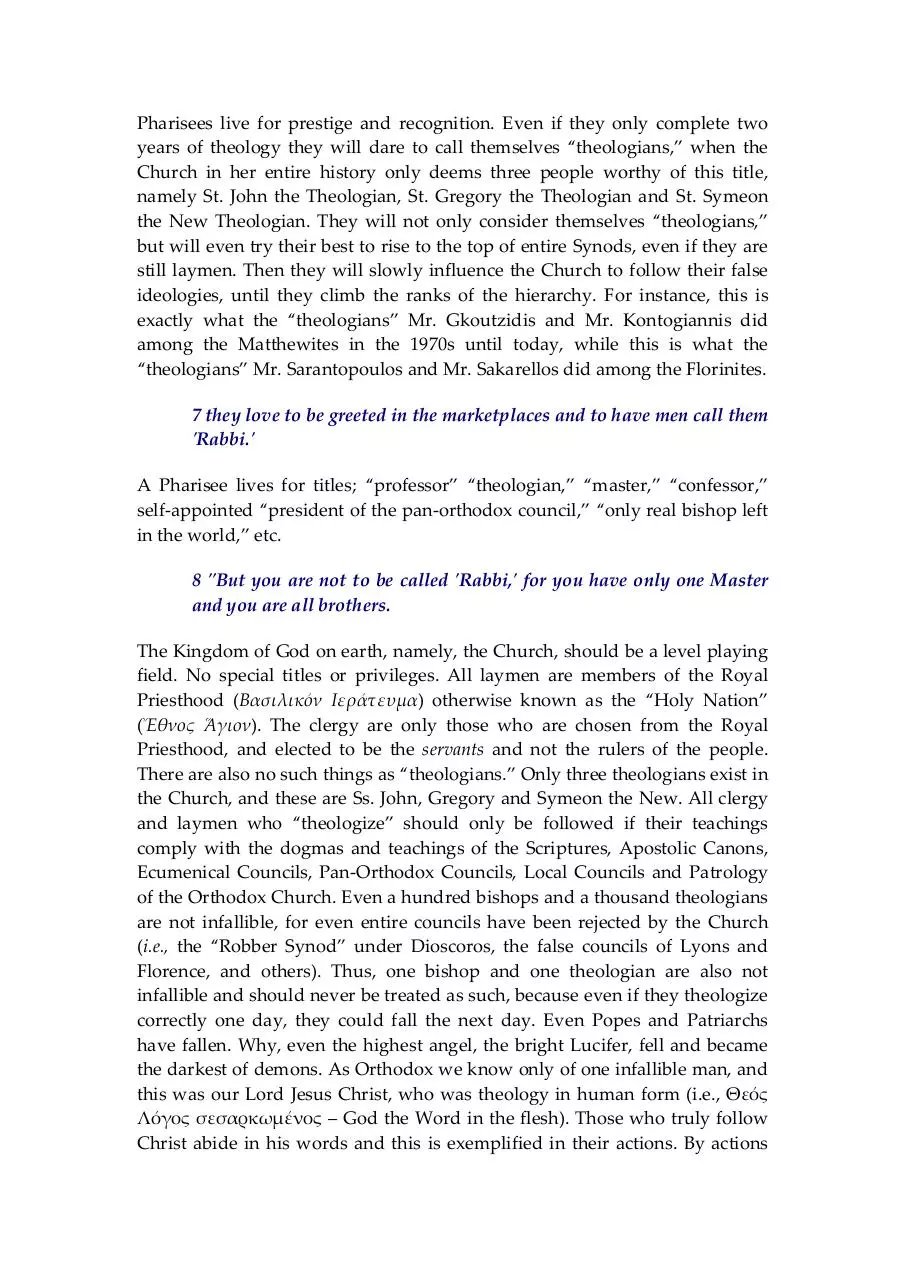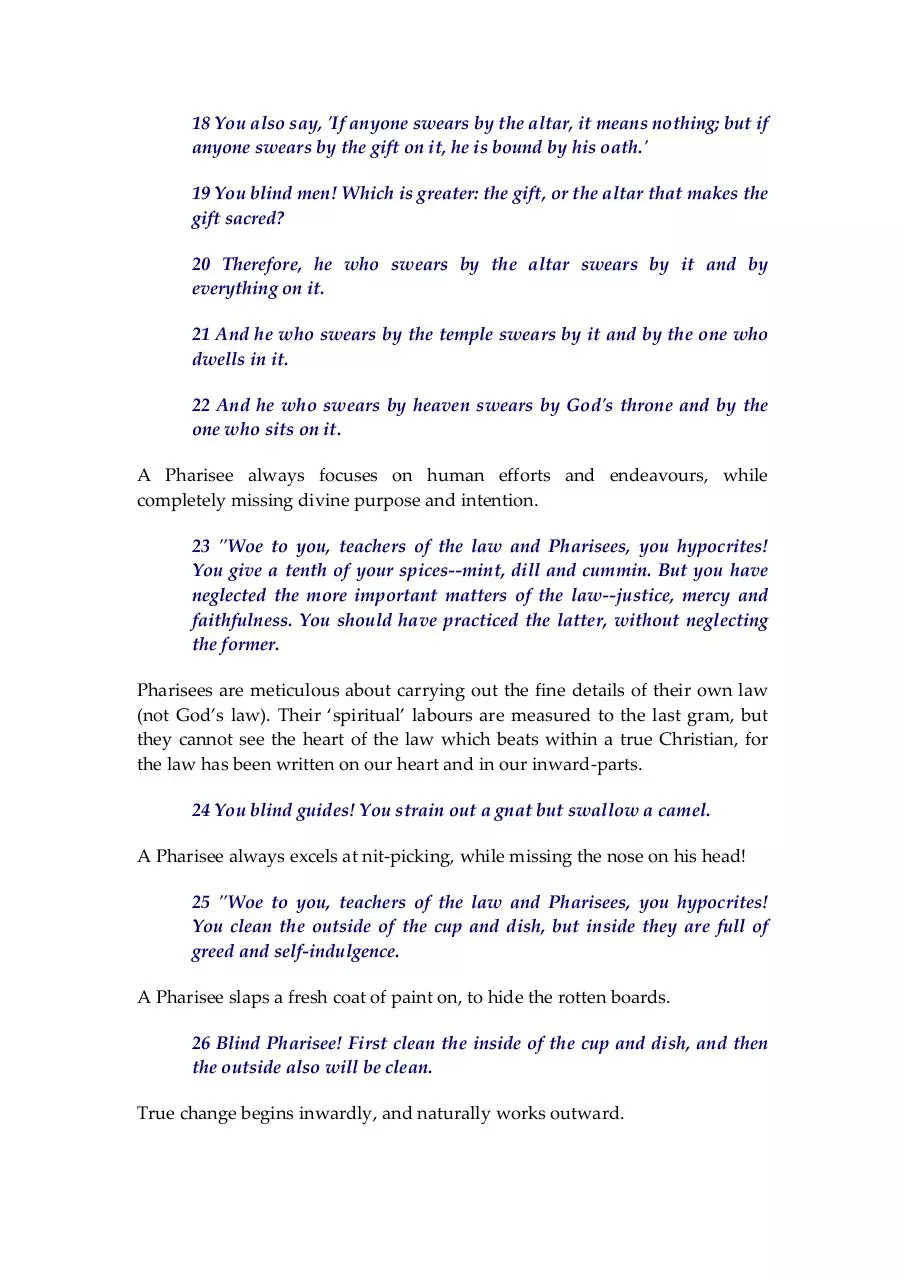contracerycii08 (PDF)
File information
Title: THE PROFILE OF A CONTEMPRARY PHARISEE
Author: Stavros
This PDF 1.4 document has been generated by Acrobat PDFMaker 8.1 for Word / Acrobat Distiller 8.1.0 (Windows), and has been sent on pdf-archive.com on 23/09/2014 at 09:21, from IP address 46.176.x.x.
The current document download page has been viewed 747 times.
File size: 199.49 KB (8 pages).
Privacy: public file





File preview
THE PROFILE OF A CONTEMPORARY PHARISEE
The Pharisees of Israel were meticulous in obeying the law. In fact,
they came up with hundreds of their own laws, which were supposed to help
them better obey God’s laws. They constantly opposed Jesus Christ, and
sought to trap him. But the Pharisees are not a past phenomenon but also
exist today. They are not only among the Jews, but even among the
Christians, even among the “Genuine Orthodox Christians.”
Thus we must beware of them, because they are truly the greatest
enemies of Christ. We must remember that the harlots and the tax‐collectors
were changed by Christ’s message and they truly became Christian. But the
Pharisees not only refused to change, but it was they who judged Christ and
demanded his crucifixion. We must never cease to forget this historical
Christian truth. Pharisees lurking within Christianity were also the source for
almost every heresy, including the heresies of Papism and Ecumenism.
The following quote is from the Gospel of Matthew (Matthew 23:1‐35):
1 Then Jesus said to the crowds and to his disciples:
2 ʺThe teachers of the law and the Pharisees sit in Mosesʹ seat.
A Pharisee is someone in the position of authority.
3 So you must obey them and do everything they tell you. But do not
do what they do, for they do not practice what they preach.
The Pharisees does not practice what he preaches (otherwise known as
hypocrite or actor).
4 They tie up heavy loads and put them on menʹs shoulders, but they
themselves are not willing to lift a finger to move them.
The demands of a Pharisee are burdensome. They offer no help or assistance.
5 ʺEverything they do is done for men to see: They make their
phylacteries wide and the tassels on their garments long;
A Pharisee makes sure you know how spiritual he is, much more spiritual
than you!
6 they love the place of honour at banquets and the most important
seats in the synagogues;
Pharisees live for prestige and recognition. Even if they only complete two
years of theology they will dare to call themselves “theologians,” when the
Church in her entire history only deems three people worthy of this title,
namely St. John the Theologian, St. Gregory the Theologian and St. Symeon
the New Theologian. They will not only consider themselves “theologians,”
but will even try their best to rise to the top of entire Synods, even if they are
still laymen. Then they will slowly influence the Church to follow their false
ideologies, until they climb the ranks of the hierarchy. For instance, this is
exactly what the “theologians” Mr. Gkoutzidis and Mr. Kontogiannis did
among the Matthewites in the 1970s until today, while this is what the
“theologians” Mr. Sarantopoulos and Mr. Sakarellos did among the Florinites.
7 they love to be greeted in the marketplaces and to have men call them
ʹRabbi.ʹ
A Pharisee lives for titles; “professor” “theologian,” “master,” “confessor,”
self‐appointed “president of the pan‐orthodox council,” “only real bishop left
in the world,” etc.
8 ʺBut you are not to be called ʹRabbi,ʹ for you have only one Master
and you are all brothers.
The Kingdom of God on earth, namely, the Church, should be a level playing
field. No special titles or privileges. All laymen are members of the Royal
Priesthood (Βασιλικόν Ιεράτευμα) otherwise known as the “Holy Nation”
(Ἔθνος Ἅγιον). The clergy are only those who are chosen from the Royal
Priesthood, and elected to be the servants and not the rulers of the people.
There are also no such things as “theologians.” Only three theologians exist in
the Church, and these are Ss. John, Gregory and Symeon the New. All clergy
and laymen who “theologize” should only be followed if their teachings
comply with the dogmas and teachings of the Scriptures, Apostolic Canons,
Ecumenical Councils, Pan‐Orthodox Councils, Local Councils and Patrology
of the Orthodox Church. Even a hundred bishops and a thousand theologians
are not infallible, for even entire councils have been rejected by the Church
(i.e., the “Robber Synod” under Dioscoros, the false councils of Lyons and
Florence, and others). Thus, one bishop and one theologian are also not
infallible and should never be treated as such, because even if they theologize
correctly one day, they could fall the next day. Even Popes and Patriarchs
have fallen. Why, even the highest angel, the bright Lucifer, fell and became
the darkest of demons. As Orthodox we know only of one infallible man, and
this was our Lord Jesus Christ, who was theology in human form (i.e., Θεός
Λόγος σεσαρκωμένος – God the Word in the flesh). Those who truly follow
Christ abide in his words and this is exemplified in their actions. By actions
we do not mean outward appearance, but inward reality. Those who speak of
or seek after outward appearance are Pharisees in their “finest” form.
9 And do not call anyone on earth ʹfather,ʹ for you have one Father,
and he is in heaven.
10 Nor are you to be called ʹteacher,ʹ for you have one Teacher, the
Christ.
The Pharisee finds it hard to survive in an atmosphere which is God‐centred
in its focus. They need the focus to be on themselves!
11 The greatest among you will be your servant.
In the Kingdom of God on earth, namely the Church, there is meant to be a
revolution of leadership. The greatest in rank is the servant of all.
12 For whoever exalts himself will be humbled, and whoever humbles
himself will be exalted.
In the Kingdom of God, one truly increases his spiritual ‘rank’ by demoting
himself, utterly humiliating himself, and making himself the least of all.
13 ʺWoe to you, teachers of the law and Pharisees, you hypocrites!
You shut the kingdom of heaven in menʹs faces. You yourselves do not
enter, nor will you let those enter who are trying to.
Pharisees make it hard to enter the Kingdom. Their near‐dead souls and
bodies block the way to those seeking entrance.
15 ʺWoe to you, teachers of the law and Pharisees, you hypocrites!
You travel over land and sea to win a single convert, and when he
becomes one, you make him twice as much a son of hell as you are.
Pharisees are zealous to win people over to their way (consider Saul of Tarsus
before Christ converted him). Their errors are magnified and amplified as
they are passed onto their followers.
16 ʺWoe to you, blind guides! You say, ʹIf anyone swears by the
temple, it means nothing; but if anyone swears by the gold of the
temple, he is bound by his oath.ʹ
17 You blind fools! Which is greater: the gold, or the temple that makes
the gold sacred?
18 You also say, ʹIf anyone swears by the altar, it means nothing; but if
anyone swears by the gift on it, he is bound by his oath.ʹ
19 You blind men! Which is greater: the gift, or the altar that makes the
gift sacred?
20 Therefore, he who swears by the altar swears by it and by
everything on it.
21 And he who swears by the temple swears by it and by the one who
dwells in it.
22 And he who swears by heaven swears by Godʹs throne and by the
one who sits on it.
A Pharisee always focuses on human efforts and endeavours, while
completely missing divine purpose and intention.
23 ʺWoe to you, teachers of the law and Pharisees, you hypocrites!
You give a tenth of your spices‐‐mint, dill and cummin. But you have
neglected the more important matters of the law‐‐justice, mercy and
faithfulness. You should have practiced the latter, without neglecting
the former.
Pharisees are meticulous about carrying out the fine details of their own law
(not God’s law). Their ‘spiritual’ labours are measured to the last gram, but
they cannot see the heart of the law which beats within a true Christian, for
the law has been written on our heart and in our inward‐parts.
24 You blind guides! You strain out a gnat but swallow a camel.
A Pharisee always excels at nit‐picking, while missing the nose on his head!
25 ʺWoe to you, teachers of the law and Pharisees, you hypocrites!
You clean the outside of the cup and dish, but inside they are full of
greed and self‐indulgence.
A Pharisee slaps a fresh coat of paint on, to hide the rotten boards.
26 Blind Pharisee! First clean the inside of the cup and dish, and then
the outside also will be clean.
True change begins inwardly, and naturally works outward.
27 ʺWoe to you, teachers of the law and Pharisees, you hypocrites!
You are like whitewashed tombs, which look beautiful on the outside
but on the inside are full of dead menʹs bones and everything unclean.
28 In the same way, on the outside you appear to people as righteous
but on the inside you are full of hypocrisy and wickedness.
The grass is mowed and the windows are washed, but beware the killer
lurking just behind the curtains!
29 ʺWoe to you, teachers of the law and Pharisees, you hypocrites!
You build tombs for the prophets and decorate the graves of the
righteous.
30 And you say, ʹIf we had lived in the days of our forefathers, we
would not have taken part with them in shedding the blood of the
prophets.ʹ
Pharisees of today like to think that they are not at all like the Pharisees of
bygone days.
31 So you testify against yourselves that you are the descendants of
those who murdered the prophets.
Pharisees can’t quite hide who they really are.
32 Fill up, then, the measure of the sin of your forefathers!
33 ʺYou snakes! You brood of vipers! How will you escape being
condemned to hell?
34 Therefore I am sending you prophets and wise men and teachers.
Some of them you will kill and crucify; others you will flog in your
synagogues and pursue from town to town.
35 And so upon you will come all the righteous blood that has been
shed on earth, from the blood of righteous Abel to the blood of
Zechariah son of Berekiah, whom you murdered between the temple
and the altar.
(Matt 23:1‐35)
The following quotes are from the Gospel of Mark (Mark 7:4‐9, 7:13):
4 When they come from the marketplace they do not eat unless they
wash. And they observe many other traditions, such as the washing of
cups, pitchers and kettles.
5 So the Pharisees and teachers of the law asked Jesus, ʺWhy donʹt
your disciples live according to the tradition of the elders instead of
eating their food with ʹuncleanʹ hands?ʺ
Pharisees always watch you to make sure you are living “correctly” according
to their own view.
6 He replied, ʺIsaiah was right when he prophesied about you
hypocrites; as it is written: ʺʹThese people honour me with their lips,
but their hearts are far from me.
There is no connection between a Pharisee’s mouth and heart. Their mouth
pretends to praise God, but inside their heart they don’t really believe in Him.
7 They worship me in vain; their teachings are but rules taught by
men.ʹ
Pharisees are following their own self‐made religion. It profits nothing.
8 You have let go of the commands of God and are holding on to the
traditions of men.ʺ
9 And he said to them: ʺYou have a fine way of setting aside the
commands of God in order to observe your own traditions!
(Mark 7:4‐9)
A Pharisee’s traditions always overrule the commands of God.
13 ʺmaking the word of God of no effect through your tradition which
you have handed down. And many such things you do.ʺ
(Mark 7:13)
A Pharisee’s traditions subvert and neutralize the commands of God. This is
one of the most deadly actions of a Pharisee, for it ignores what God has said,
and puts the teachings of man in the place of Divine Revelation.
Now all of the above has now given you the basic understanding of
what a Pharisee is. Pharisees are not an obscure Jewish sect of the past. They
are found throughout Christian history and they exist even today. They either
created the heresies and schisms that fell from the Church, or they continue to
lurk within the Church. Now that you have a profile of what a Pharisee is you
will be able to perceive who is a Pharisee. I assure you that you will meet
Pharisees every day, and even in your local church. If you are honest, you will
also see a Pharisee looking back at you in the mirror from time to time. But
the worst of all is if a Pharisee is the leader of your Church. When this is the
case it is the most self‐destructive experience the Church can ever go through.
Jesus Christ’s harshest words and fiercest battles involved the
Pharisees. Follow his example in not yielding an inch to their demands. Abide
in Christ’s words and in the Laws of the Church. Obey only God and his Law,
and do not obey the man‐made laws of bishops or priests who contradict
Christ and his Law. For in so doing you cease to be a Genuine Orthodox
Christian and instead become a “Kirykite,” a “Nicholaitan,” a “Gregorian,” a
“Metropoulite,” a “Cyprianite,” a “Kiousite,” a “Makarian,” an “Auxentian,”
a “Maximite,” a “Panteleimonite,” a follower of men rather than a follower of
God. Remember that we are living in the prophetic “Eighth Age” in which,
according to St. Nilus, the true Christians shall have no trust for the clergy. Of
course we are to respect, and honour, and venerate their priesthood. But we
are certainly not to obey their man‐made laws if they contradict Orthodoxy.
But the correction against Pharisaism must begin from us. Are we
Pharisees? Are you a Pharisee? If so, cease your Pharisaism. Stop believing in
man‐made laws, and believe only in the Law of God, as included in the Holy
Scriptures, in the Holy Canons of the Ecumenical Councils, Local Councils
and Holy Fathers, and in the God‐inspired Patrology. Stop placing fierce and
burdensome demands on others. If you desire to follow strict rules and
regimes that go beyond what the Fathers have foreordained, then you are free
to do this yourself. But do it yourself without boasting of it to others, and do
not demand it upon others. Be as much of an ascetic as you see fit, but do not
burden others with your ideal of asceticism. Even more so, do not burden
others with rules that you do not even follow yourself. Then you will cease to
be a Pharisee and begin being a true Christian. Do not teach others by words
but by example. This means you will not need to teach with your mouth, but
with the love of your heart and the actions of your hands.
You cannot make your bishops or priests into Christians. They will
need to do it themselves. But at least shun the Pharisaism of your bishops and
priests. Shun their evil works, and try to be Christian yourself. If we all do
this, the Genuine Orthodox Christians in their entirety will rise from their
current state of dead complacency, and will begin living in Christ the Logos
of God and breathing the Holy Spirit of God in their everyday lives. But this
acquisition of the Spirit of Peace can begin with each person individually, and
it will lead to a general resuscitation of the whole Church in general.
In the words of St. Seraphim of Sarov: “Acquire the Spirit of Peace and
thousands around you will be saved.” May St. Seraphim of Sarov intercede to
God for us that we may acquire the Spirit of Peace; that we may shake off the
leaven of the Pharisees, replacing it with the Bread of Life which came down
from Heaven; and that we may learn to be Genuine Orthodox Christians not
only in name and outward appearance, but also in truth and inward reality.
Amen.
Download contracerycii08
contracerycii08.pdf (PDF, 199.49 KB)
Download PDF
Share this file on social networks
Link to this page
Permanent link
Use the permanent link to the download page to share your document on Facebook, Twitter, LinkedIn, or directly with a contact by e-Mail, Messenger, Whatsapp, Line..
Short link
Use the short link to share your document on Twitter or by text message (SMS)
HTML Code
Copy the following HTML code to share your document on a Website or Blog
QR Code to this page

This file has been shared publicly by a user of PDF Archive.
Document ID: 0000185273.